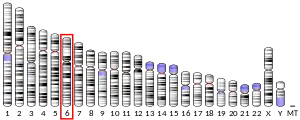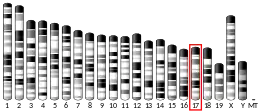OPN5
Neuropsin is a protein that in humans is encoded by the OPN5 gene.[5][6][7] It is a photoreceptor protein sensitive to ultraviolet (UV) light. The OPN5 gene was discovered in mouse and human genomes and its mRNA expression was also found in neural tissues. Neuropsin is bistable at 0 °C and activates a UV-sensitive, heterotrimeric G protein Gi-mediated pathway in mammalian and avian tissues.[8][9]
Function
Opsins are members of the G protein-coupled receptor superfamily. Human neuropsin is expressed in the eye, brain, testes, and spinal cord. Neuropsin belongs to the seven-exon subfamily of mammalian opsin genes that includes peropsin (RRH) and retinal G protein coupled receptor (RGR). Neuropsin has different isoforms created by alternative splicing.[7]
Photochemistry
When reconstituted with 11-cis-retinal, mouse and human neuropsins absorb maximally at 380 nm. When illuminated these neuropsins are converted into blue-absorbing photoproducts (470 nm), which are stable in the dark. The photoproducts are converted back to the UV-absorbing form, when they are illuminated with orange light (> 520 nm).[8]
Phylogeny
The neuropsins constitute one of the four subclades of the Go/RGR group of opsins, also known as RGR/Go or Group 4. Go/RGR is one of the four major subclades of type-II opsins, also known as metazoan or animal opsins. Go/RGR comprises Go-coupled, RGR, peropsins, and neuropsins. Type-II opsins comprise four subclades: C-opsins (ciliary), R-opsins (rhabdomeric), Cnidops (cnidarian), and Go/RGR. Three of these subclades occur only in Bilateria (all but Cnidops). However, the bilaterian clades constitute a parphyletic taxon without Cnidops.[10][11]
Species Distribution
Neuropsin and its orthologs have been found experimentally in a small number of animals, among them human, house mouse (Mus musculus),[5] chicken (Gallus gallus domesticus),[9][12] the Japanese quail (Coturnix japonica),[13] the European brittle star Amphiura filiformis (related to starfish),[14] the tardigrade water bear (Hypsibius dujardini),[15] and the tadpole of Xenopus laevis.[16]
Searches of publicly available databases of genetic sequences have found putative neuropsin orthologs in both major branches of Bilateria: protostomes and deuterostomes. Among protostomes, putative neuropsins have been found in the molluscs owl limpet (Lottia gigantea) (a species of sea snail) and Pacific oyster (Crassostrea gigas), in the water flea (Daphnia pulex) (an arthropod), and in the annelid worm Capitella teleta.[15]
References
- GRCh38: Ensembl release 89: ENSG00000124818 - Ensembl, May 2017
- GRCm38: Ensembl release 89: ENSMUSG00000043972 - Ensembl, May 2017
- "Human PubMed Reference:". National Center for Biotechnology Information, U.S. National Library of Medicine.
- "Mouse PubMed Reference:". National Center for Biotechnology Information, U.S. National Library of Medicine.
- Tarttelin EE, Bellingham J, Hankins MW, Foster RG, Lucas RJ (Nov 2003). "Neuropsin (Opn5): a novel opsin identified in mammalian neural tissue". FEBS Letters. 554 (3): 410–6. doi:10.1016/S0014-5793(03)01212-2. PMID 14623103. S2CID 9577067.
- Fredriksson R, Höglund PJ, Gloriam DE, Lagerström MC, Schiöth HB (Nov 2003). "Seven evolutionarily conserved human rhodopsin G protein-coupled receptors lacking close relatives". FEBS Letters. 554 (3): 381–8. doi:10.1016/S0014-5793(03)01196-7. PMID 14623098. S2CID 11563502.
- "Entrez Gene: OPN5 opsin 5".
- Kojima D, Mori S, Torii M, Wada A, Morishita R, Fukada Y (2011). "UV-sensitive photoreceptor protein OPN5 in humans and mice". PLOS ONE. 6 (10): e26388. Bibcode:2011PLoSO...626388K. doi:10.1371/journal.pone.0026388. PMC 3197025. PMID 22043319.
- Yamashita, T.; Ohuchi, H.; Tomonari, S.; Ikeda, K.; Sakai, K.; Shichida, Y. (6 December 2010). "Opn5 is a UV-sensitive bistable pigment that couples with Gi subtype of G protein" (PDF). Proceedings of the National Academy of Sciences. 107 (51): 22084–22089. Bibcode:2010PNAS..10722084Y. doi:10.1073/pnas.1012498107. PMC 3009823. PMID 21135214.
- Porter ML, Blasic JR, Bok MJ, Cameron EG, Pringle T, Cronin TW, Robinson PR (Jan 2012). "Shedding new light on opsin evolution". Proceedings of the Royal Society B: Biological Sciences. 279 (1726): 3–14. doi:10.1098/rspb.2011.1819. PMC 3223661. PMID 22012981.
- Liegertová M, Pergner J, Kozmiková I, Fabian P, Pombinho AR, Strnad H, Pačes J, Vlček Č, Bartůněk P, Kozmik Z (2015). "Cubozoan genome illuminates functional diversification of opsins and photoreceptor evolution". Scientific Reports. 5: 11885. Bibcode:2015NatSR...511885L. doi:10.1038/srep11885. PMC 5155618. PMID 26154478.
- Tomonari S, Migita K, Takagi A, Noji S, Ohuchi H (Jul 2008). "Expression patterns of the opsin 5-related genes in the developing chicken retina". Developmental Dynamics. 237 (7): 1910–22. doi:10.1002/dvdy.21611. PMID 18570255. S2CID 42113764.
- Nakane Y, Ikegami K, Ono H, Yamamoto N, Yoshida S, Hirunagi K, Ebihara S, Kubo Y, Yoshimura T (Aug 2010). "A mammalian neural tissue opsin (Opsin 5) is a deep brain photoreceptor in birds". Proceedings of the National Academy of Sciences of the United States of America. 107 (34): 15264–8. Bibcode:2010PNAS..10715264N. doi:10.1073/pnas.1006393107. PMC 2930557. PMID 20679218.
- Delroisse J, Ullrich-Lüter E, Ortega-Martinez O, Dupont S, Arnone MI, Mallefet J, Flammang P (2014). "High opsin diversity in a non-visual infaunal brittle star". BMC Genomics. 15 (1): 1035. doi:10.1186/1471-2164-15-1035. PMC 4289182. PMID 25429842.
- Hering L, Mayer G (Sep 2014). "Analysis of the opsin repertoire in the tardigrade Hypsibius dujardini provides insights into the evolution of opsin genes in panarthropoda". Genome Biology and Evolution. 6 (9): 2380–91. doi:10.1093/gbe/evu193. PMC 4202329. PMID 25193307.
- Currie, Stephen P.; Doherty, Gayle H.; Sillar, Keith T. (10 May 2016). "Deep-brain photoreception links luminance detection to motor output in frog tadpoles". Proceedings of the National Academy of Sciences. 113 (21): 6053–8. doi:10.1073/pnas.1515516113. PMC 4889350. PMID 27166423.
Further reading
- Terakita A (2005). "The opsins". Genome Biology. 6 (3): 213. doi:10.1186/gb-2005-6-3-213. PMC 1088937. PMID 15774036.
- Vassilatis DK, Hohmann JG, Zeng H, Li F, Ranchalis JE, Mortrud MT, Brown A, Rodriguez SS, Weller JR, Wright AC, Bergmann JE, Gaitanaris GA (Apr 2003). "The G protein-coupled receptor repertoires of human and mouse". Proceedings of the National Academy of Sciences of the United States of America. 100 (8): 4903–8. Bibcode:2003PNAS..100.4903V. doi:10.1073/pnas.0230374100. PMC 153653. PMID 12679517.
This article incorporates text from the United States National Library of Medicine, which is in the public domain.



